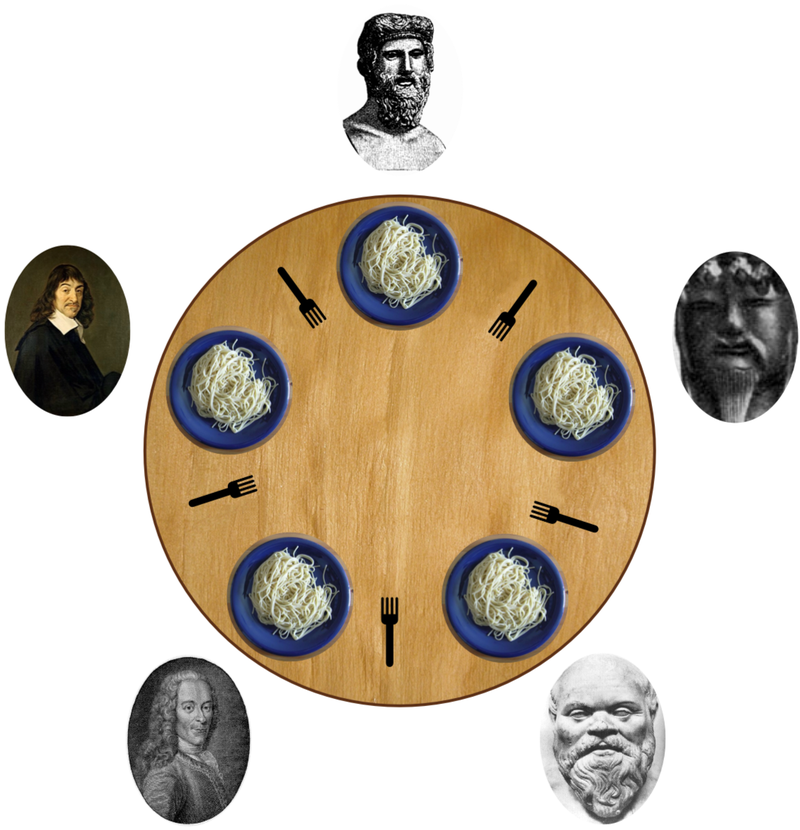Welcome to Subscribe On Youtube
1226. The Dining Philosophers
Description
Five silent philosophers sit at a round table with bowls of spaghetti. Forks are placed between each pair of adjacent philosophers.
Each philosopher must alternately think and eat. However, a philosopher can only eat spaghetti when they have both left and right forks. Each fork can be held by only one philosopher and so a philosopher can use the fork only if it is not being used by another philosopher. After an individual philosopher finishes eating, they need to put down both forks so that the forks become available to others. A philosopher can take the fork on their right or the one on their left as they become available, but cannot start eating before getting both forks.
Eating is not limited by the remaining amounts of spaghetti or stomach space; an infinite supply and an infinite demand are assumed.
Design a discipline of behaviour (a concurrent algorithm) such that no philosopher will starve; i.e., each can forever continue to alternate between eating and thinking, assuming that no philosopher can know when others may want to eat or think.

The problem statement and the image above are taken from wikipedia.org
The philosophers' ids are numbered from 0 to 4 in a clockwise order. Implement the function void wantsToEat(philosopher, pickLeftFork, pickRightFork, eat, putLeftFork, putRightFork) where:
philosopheris the id of the philosopher who wants to eat.pickLeftForkandpickRightForkare functions you can call to pick the corresponding forks of that philosopher.eatis a function you can call to let the philosopher eat once he has picked both forks.putLeftForkandputRightForkare functions you can call to put down the corresponding forks of that philosopher.- The philosophers are assumed to be thinking as long as they are not asking to eat (the function is not being called with their number).
Five threads, each representing a philosopher, will simultaneously use one object of your class to simulate the process. The function may be called for the same philosopher more than once, even before the last call ends.
Example 1:
Input: n = 1
Output: [[4,2,1],[4,1,1],[0,1,1],[2,2,1],[2,1,1],[2,0,3],[2,1,2],[2,2,2],[4,0,3],[4,1,2],[0,2,1],[4,2,2],[3,2,1],[3,1,1],[0,0,3],[0,1,2],[0,2,2],[1,2,1],[1,1,1],[3,0,3],[3,1,2],[3,2,2],[1,0,3],[1,1,2],[1,2,2]]
Explanation:
n is the number of times each philosopher will call the function.
The output array describes the calls you made to the functions controlling the forks and the eat function, its format is:
output[i] = [a, b, c] (three integers)
- a is the id of a philosopher.
- b specifies the fork: {1 : left, 2 : right}.
- c specifies the operation: {1 : pick, 2 : put, 3 : eat}.
Constraints:
1 <= n <= 60
Solutions
-
class DiningPhilosophers { public: using Act = function<void()>; void wantsToEat(int philosopher, Act pickLeftFork, Act pickRightFork, Act eat, Act putLeftFork, Act putRightFork) { /* 这一题实际上是用到了C++17中的scoped_lock知识。 作用是传入scoped_lock(mtx1, mtx2)两个锁,然后在作用范围内,依次顺序上锁mtx1和mtx2;然后在作用范围结束时,再反续解锁mtx2和mtx1。 从而保证了philosopher1有动作的时候,philosopher2无法操作;但是philosopher3和philosopher4不受影响 */ std::scoped_lock lock(mutexes_[philosopher], mutexes_[philosopher >= 4 ? 0 : philosopher + 1]); pickLeftFork(); pickRightFork(); eat(); putLeftFork(); putRightFork(); } private: vector<mutex> mutexes_ = vector<mutex>(5); };